LITERATURE:
Celebrating 100 Years: Saadat Hasan Manto
For one of the greatest Urdu short story writers the world has ever known, the personal journey was as troubled as the time in history, he drew inspiration from. Manto died of alcoholism in Lahore at age 42. Today as we mark the centenary of this writer, Ras H. Siddiqui explores his writings and the message they tried to portray.
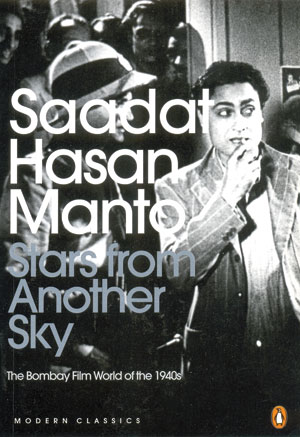 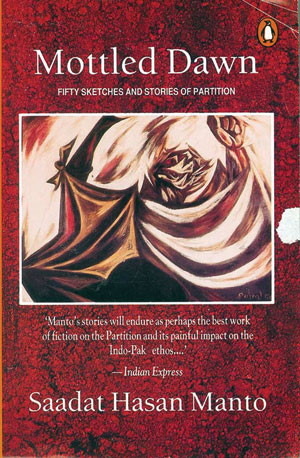
(Above): Books on the Bombay Film Industry (l) and the Partition of India written by Manto. (Below): Saadat Hasan Manto.
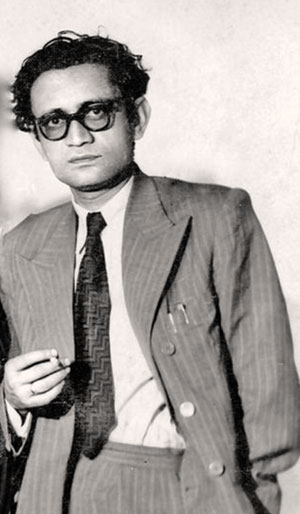 Born and raised in Papraudi village a few kilometers from Samrala town, in Ludhiana, Punjab, the late Sadat Hasan Manto (1912-1955) left us horrified, speechless and even offended while he scribed for the world, the depths of depravity, uncertainty and the many ironies encountered during the partition of British India (into the independent states of India and Pakistan) in 1947. Born and raised in Papraudi village a few kilometers from Samrala town, in Ludhiana, Punjab, the late Sadat Hasan Manto (1912-1955) left us horrified, speechless and even offended while he scribed for the world, the depths of depravity, uncertainty and the many ironies encountered during the partition of British India (into the independent states of India and Pakistan) in 1947.
Since 2012 was heralded as the year of the Manto Centenary, this scribe just could not let it close without saying some sort of goodbye. Being weak in Urdu script reading does not help matters here but thanks to translations of Manto’s writing by other people who have had a strong command of both the Urdu language and English, like the late Khalid Hasan amongst others, Manto has not been a stranger.
Thanks are also in order to a television series called Mantorama on PTV during the early 1970’s for Manto success in capturing this scribe’s imagination. The attention that he has been getting this year has some much older beginnings which include his stints in Bombay’s nascent film industry and post partition Lahore.
This has also been the year that the three daughters of Saadat and Safiyah Manto, namely Nighat, Nuzhat and Nusrat finally visited his birthplace in India to a warm welcome. Manto also had an Aligarh Muslim University connection since he did attend that unique house of learning for a short time. It has been reported that he was initially inspired into the writing field by one Abdul Bari Alig, an author and a historian himself, who introduced young Manto to the works of Western authors.
Manto started off by translating Victor Hugo’s The Last Day of a Condemned Man into Urdu, which was published in Lahore, launching him into the realm of Urdu writing. He also translated Oscar Wilde and works of Russian writers but his own original story writing soon became a passion in the process.
In a way this article is an attempt to stir up some more reader interest in this Urdu writer whose intensity of portraying some of the grimmest aspects of South Asian life remains unparalleled. What Manto did was something quite revolutionary in Urdu literature. He took symbolism and threw it out of the window and minced no words to hide what happened to people (especially women) during 1947. He described the rape and murder committed in the name of religion just like it occurred. Many people who once lived together in the same community and happened to be Hindu, Muslim or Sikh suddenly ceased to be human. Some almost became beasts when the forces of history marched on. Manto in the process of detailing this descent into madness and its aftereffects ended up defending himself against many cases of obscenity leveled against him in the new country of Pakistan (which he opted to move to in 1948). Urdu literature especially its poetry, has always been well known for projecting very profound thoughts wrapped in veiled and very symbolic clothing. Manto made the “error” of taking off this clothing completely in his writing (sometimes quite literally as in his story Khol Do). He also ran into a wall of people in two new countries (India and Pakistan) who wanted to hide under the rug what they once did to each other and move on. Manto, unfortunately for them, was not one to forget.
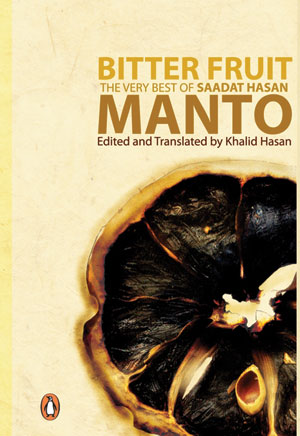 (Right): Manto's work translated by Khalid Hasan. (Right): Manto's work translated by Khalid Hasan.
Saadat Hasan Manto wrote about sex long before it became an acceptable norm even in the Western world. His “Bu” (Smell) created a stir in pre-partition India. Later in a writing titled “Thanda Gosht” (Cold Flesh) he almost ventured out into the topic of necrophilia which generated the wrong kind of attention and won him a long trip to the courts for obscenity. Besides sex, there is plenty of murder in Manto’s writings since the late 1940’s were quite a murderous period in British Indian history, especially in Punjab.
Manto was deemed both an opportunist by left leaning progressives and a troublemaker by the conservative establishment in the new Pakistan. India took him off the radar too for quite some time (but he was not totally forgotten). His famous “Letters to Uncle Sam” were both witty and sarcastic but he was not as opposed to America as many of his contemporaries. By the time that he died Saadat Hasan Manto has offended and irritated just about everybody that mattered. But whose side was he really on? The answer might be that he always championed residual humanity. The term “residual” is applied to those of his characters who were already downtrodden, violated, dispossessed, brutalized or the perpetrators of many sins, bewildered to discover that they still retain some leftover qualities that human beings just cannot completely let go of.
The last big reason has to be his masterpiece “Toba Tek Singh” which ridicules the attempts which were made to partition everything in 1947 between India and Pakistan (in that attempt hundreds of thousands perished). Manto’s fictional insane asylum Toba Tek Singh too is partitioned with Hindu and Sikh residents being forcibly transported out of Pakistan. The questions seriously asked in this particular writing of Manto’s are, how does one really go about partitioning insanity and why? The Manto centenary should encourage Indians and Pakistanis to read and in some cases rediscover Saadat Hasan Manto for themselves even if it is in translation.
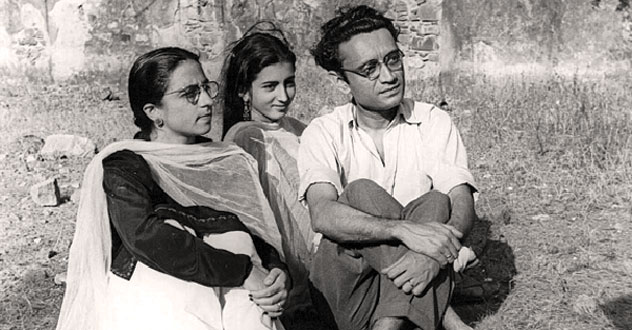
(Above): Manto with his wife and sister-in-law.
Let us not celebrate and forget his 100 years (many of which were spent in controversy) but use his works today, to look back at our beginnings and find in them some food for thought for the future of the South Asian region.
|